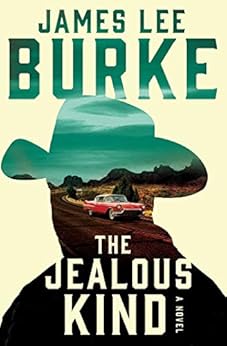
I can't recall if I've read James Lee Burke before but perhaps not. His characters are razor-sharp in their realism, his plots gripping as slides the blade.
Where to start? He won Edgar Awards for Black Cherry Blues and Cimarron Rose while Amazon readers ranked Purple Cane Road as his best. He also has two collections of stories published in literary journals like Antioch, Chariton Review, Southern Review, Shenandoah, and so forth. So I think I'll try those out next.
Someone at The New York Times Book Review called The Jealous Kind's examination of the 1950's “nostalgia noir.” I didn't realize it was part of a series (the Holland Family), but I didn't feel left out.
Aaron Holland Broussard gets embroiled in a fight with a rich kid, Grady Harrelson, over his soon-to-be-ex-girlfriend Valerie Epstein, which involves the delicious dialogue exchange:
“I thought maybe something was wrong and y’all needed help.”
“Get lost, snarf.”
“What’s a snarf?”
“Are you deaf?”
“I just want to know what a snarf is.”
“A guy who gets off on sniffing girls’ bicycle seats. Now beat it.”
The music speaker went silent. My ears were popping. I could see people’s lips moving in the other cars, but I couldn’t hear any sound. Then I said, “I don’t feel like it.”
“I don’t think I heard you right.”
“It’s a free country.”
“Not for nosy frumps, it isn’t.”
“Leave him alone, Grady,” Valerie said.
“What’s a frump?” I said.
“A guy who farts in the bathtub and bites the bubbles. Somebody put you up to this?”
“I was going to the restroom.”
“Then go.”
Saber was the only kid in school who how to stick porcupine quills in Krauser [the shop teacher who billed himself a WWII war hero but was a pain in the students' butts] and keep the wounds green on a daily basis. Krauser believed it was Saber who'd hung plunger through the hole in the ceiling, but he couldn't prove it and was always trying to find another reason to nail Saber to the wall. But Saber never misbehaved in metal shop, whereas other guys did and in serious fashion."
My main problem with the novel is the main character as an adult telling the tale. He seems to buy into his teenage reasoning, but the kid makes foolish choices which only makes things harder on himself. I didn't quite realize this until I was three-quarters through the book. His father had excellent advice of not even talking to these people, but Aaron does anyway. By luck, Aaron's mistakes are shown to be nothing and his enemies have done all the real damage. Writerly ingenuity would have been the better path, but the plot was rather convoluted, so maybe Burke needed to tame the multiplying threads.
It's a good enough novel, but probably not the place to begin.

No comments:
Post a Comment